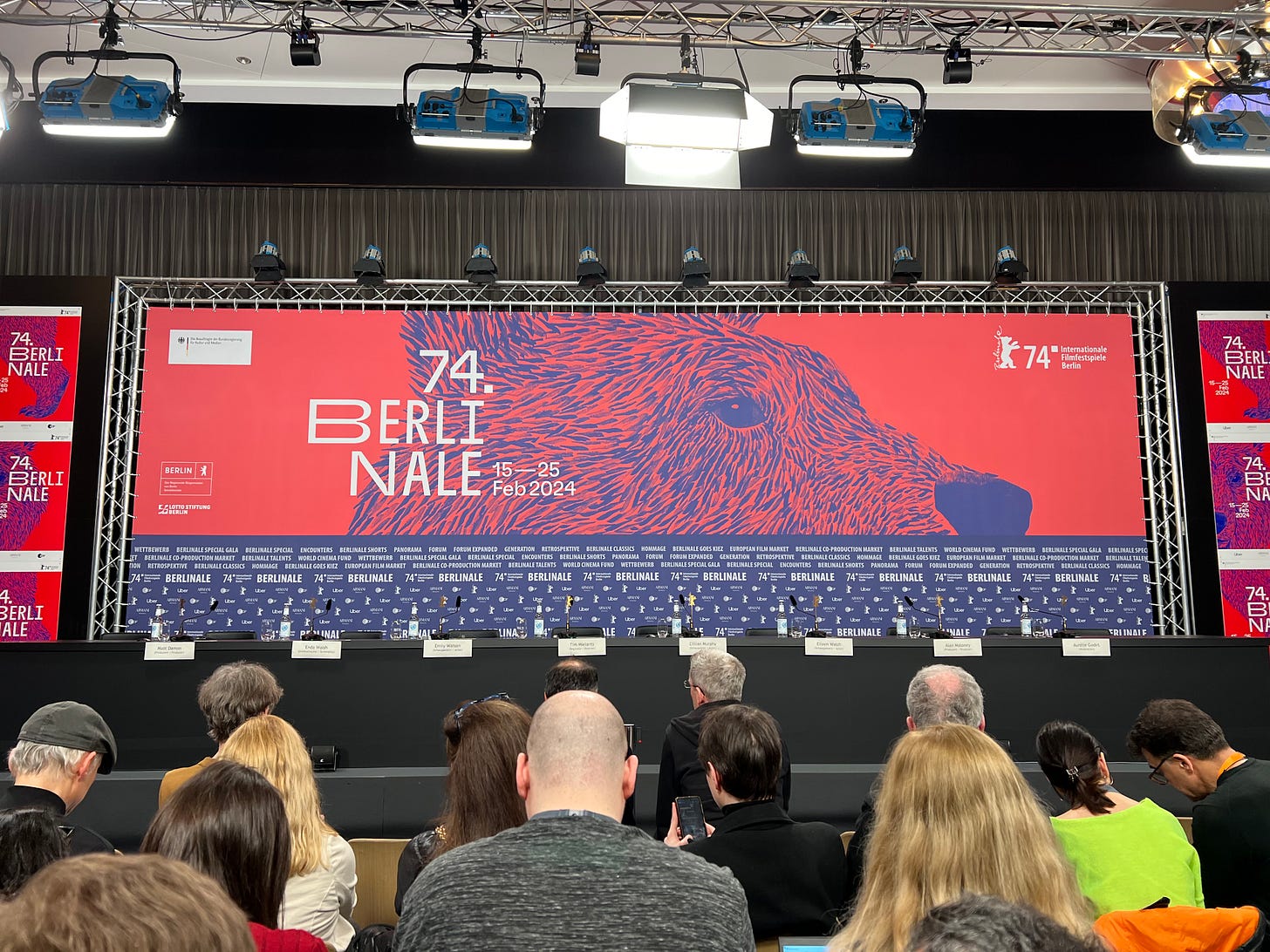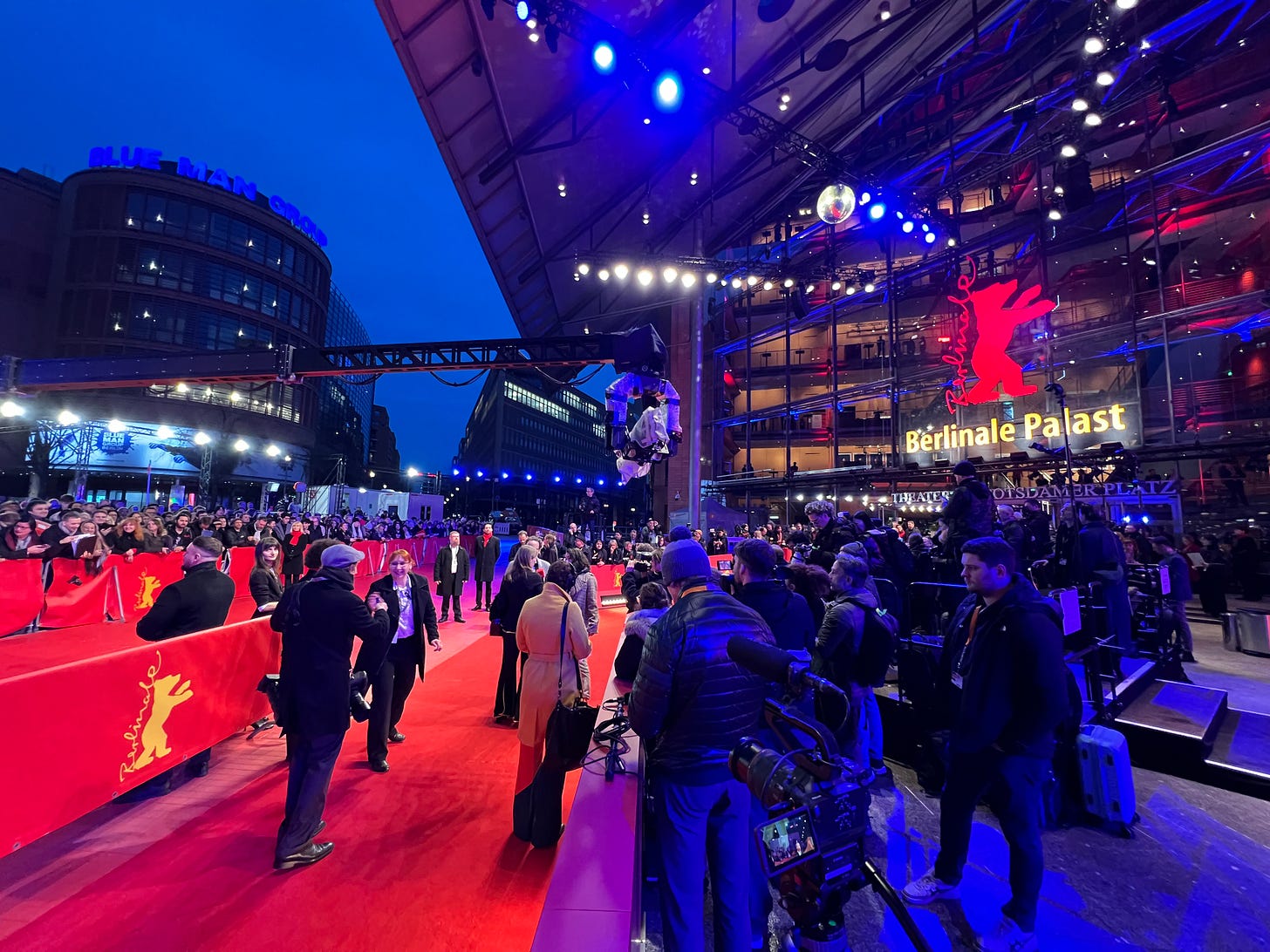The Berlinale Experience: Politics, Films, and Journo-Critics
Controversy strikes at the Berlinale, which is openly prosecuting and disowning public statements made by filmmakers against the killing of Palestinian civilians.
The Berlinale Film Festival just ended and I have some thoughts. This post will be divided into three sections (politics, films, and journalists), switching between third- and first-person where necessary. Because this was my first Berlinale, I tried soaking up as much as possible, and this post will be the juice squeezed out of those twelve days.
I’m also putting together my next Weekly Reel ranking all the films I watched, which will go more in depth on the films themselves, so look out for that as well.

Political Contradictions
As I wrote in my first two pieces on the Berlinale, I was curious how and where exactly this festival is political. The answers were, according to Jury President Lupita Nyong'o and others, to be found in the films themselves. But that directly contradicts others, including Cultural Minister Claudia Roth and Berlinale leadership, who emphasized the ‘political’ nature of the festival itself. Therefore, we have a problem of diction. And from what I can conclude after spending twelve days watching films, attending events, and observing the comings and goings is that the Berlinale is a film festival, not a political festival, and that much of everyone’s statements about this being ‘political’ is retroactively applied to carefully constructed publicity and marketing tactics that satisfies the numerous business interests involved in the real, behind the scenes selling and trading of films, festival.
Regarding the direct engagement of the Berlinale with politics, the organizers toned down the outpouring from last year’s Ukrainian exhibitions and events and went (to this day this is an ongoing escalation) well out of their way to condemn any support for Palestinians as anti-semitic. Strike Germany, initiated days before the festival, a boycott on all official German cultural events in solidarity against the funding of Israel’s murder of Palestinians, didn’t affect the festival other than three filmmakers withdrawing from the Forum Expanded section. (The Forum section and sub-sections, as well as other sections, are quasi-independent from Berlinale proper and have been pushing public statements in favor of Palestinians from the start.) Their withdrawal, which was coordinated for the start of the festival because they couldv’e pulled ever since Oct. 7, didn’t amount to wide-scale resistance and was effectively siloed. For the opening ceremony red carpet, a group of Zillennials staged a lukewarm, sanctioned protest against the War, well before the VIPs arrived. An event at Cafe Kyiv drew an impressive crowd on the first weekend that upstaged the festival on social media for an hour, but sizzled thereafter.
The Berlinale leadership issued a very quiet and now difficult to find press release halfway through condemning the killing of all people in the “Middle East,” without distinctions or specifics. Then the day after the festival ended, they announced the filing of criminal charges against unknown persons who had reportedly hacked the Berlinale Panorama Instagram channel, posting an explicit message condemning Germany’s complicity in genocide and learning nothing from their Nazi past. The post was removed soon after and it’s now too early to say what will come of the charges. In the Berlinale’s press release about this, they maintained their commitment towards not blaming one side or the other, which is their official stance, but also called out the October 7th attacks and hostage-taking and not the killing of Palestinian civilians. They even called the IG post anti-semitic even though it referenced Israel and not the Jewish people. Furthermore, they took an explicit position last year against Russia and removed Russian films, as a distinct category not including co-productions, which continued this year.
In short, the Berlinale is minimizing the politics of the Gaza-Israel War because of their deference to German politics, which was the reason for the two Berlinale leaders leaving. Like any good mobster, Germany’s Culture Minister ensured that the festival will receive funding contingent on their own politics rather than having an open dialogue. This means no AfD, pro-Israel, pro-Ukraine. No better representation of this was the TinyHouse, a literal minimization, which was a tiny shack connected to a truck hitch dropped off on the backside of a Five Guys devoted to the discussion of the War for three days. The outhouse could hold 4-6 people with two seats already occupied by the Israeli and Palestinian artists who put it together. Together with a pro-Palestinian protest confined to the entrance of Potsdamer Platz for tourists to ogle at, the Berlinale’s position on the War is quite clear: minimized, out of the way, not our problem, and now criminally prosecutable.
But the politics of their politics isn’t that simple. Having been defunded so that Germany could divert more funds towards the arms industry coffers, the Berlinale is also a victim in Germany’s ongoing support of Ukraine/Israel. It was put into the impossible damned if you do damned if you don’t position of having to be a film festival conducting massive amounts of business in the middle of a scattered socio-political landscape. The question largely becomes: what responsibility do they have, if any, in being a cultural event whose largest funding comes from a federal government that just reduced its capital and kicked out the two leaders? If it’s towards the screening and selling of new films, then they did all the right things. But on the periphery, these developments are an extreme backsliding in the wrong direction towards self-censorhip in favor of securing their diminished funding. And one needs to remember that this is all being done to ensure more sponsors don’t pull out, no matter how ugly and gross it is towards your stance on human rights and the filmmakers you’re trying to promote for financial gain.
Another related issue is the invitation/disinvitation of several AfD members to the opening ceremony. Far from giving neo-Nazis a platform, who are we kidding, this was a mildly standard gesture for members of the government who helped fund the festival to make a brief public appearance. Nobody could honestly make the argument that their red carpet walk would push Germany farther down the road to fascism. For all the commentators and protestors and organizers’ talk about how the Berlinale needs to be democratic and inclusive, there’s no reason to fear their appearance, as Christian Petzold said during his press conference. It’s especially glaring when so many organizers, including entire sections like Forum, are allowed to be overtly leftist/progressive. This is an obvious contradiction that the festival and its protestors can’t effectively manage, which goes together with their confused and reprehensible decisions to prosecute people’s online speech.
Films, Political or Otherwise
The politics of the festival were then to be found in the films and statements by the filmmakers. A handful of filmmakers gave public statements condemning the murder of Palestinians and calling for a ceasefire; nobody received more attention than Yuval Abraham, an Israeli filmmaker who won the Berlinale Documentary Award for ‘No Other Land’ along with his Palestinian co-director Basel Adra, who gave a speech calling for Germany to “respect the UN calls and stop sending weapons to Israel,” which the German Cultural Minister and Berlin Mayor have publicly disavowed (after a clip was shown of them applauding those statements at the time). Made with another two directors, ‘No Other Land’ is about Adra’s experience with Israeli settlements destroying Palestinian villages in the West Bank and his relationship with Abraham, who lives in relative comfort on the other side of the apartheid. Objections to the film and Abraham’s message are deeply incoherent: conservative Aryans calling a Jewish filmmaker/journalist anti-semitic, not understanding the difference between Gaza and the West Bank, etc. Mariëtte Rissenbeek, one of the two freshly ousted Berlinale leaders, even made a bizarre public statement trying to disown Abraham’s comments.
Another filmmaker who directly confronted this issue was Benn Russell, who won the best film in the Berlinale Encounters section and called out the genocide at the end of his acceptance speech. His film with co-director Guillaume Cailleau, ‘DIRECT ACTION,’ is a doc about the ZAD (Zone to Defend) in France, which was one of the most interesting theatrical experiences of the festival. With only forty-one shots and a 216-minute runtime, it depicted life at ZAD and de-glorified images of the direct action they take against the police looking to develop their land via activist occupation. Besides from these two rather minor instances being blown up out of proportion, no other filmmakers (unfortunately not even Mexican actor Raúl Briones, who stars in ‘La Cocina’ (a very political movie, which I covered in a previous post along with the Iranian film ‘My Favourite Cake’), wrote “Free Palestine” on his Berlinale portrait, made much of political splash.
In terms of the dominant themes and moods of the films I watched, which were primarily the more mainstream offers from the Competition and Special sections, sexuality and cultural concerns, sometimes told together, stood out. Sexuality was either the overt story (‘Love Lies Bleeding,’ ‘Langue étrangère,’ ‘I Saw the TV Glow,’ ‘Janet Planet,’ ‘Sex’) or the driver of the protagonist’s anxiety (‘A Different Man,’ ‘My Favourite Cake,’ ‘Matt and Mara’). And even more specifically sexuality as related to identity (same-sex relations or gender affirmation) resulted in the conflicts of most of these films. Although there were many more films dealing with similar stories in other sections of the festival, these films are primarily North American/Western-based, showing the obvious artistic implications to the trends in the cultural milieu.
‘I Saw the TV Glow’ in particular was the biggest curveball from the festival, which has metaphorical implications for trans identity mixed together with nineties television and neon violets. The film ran through 100 minutes faster than anything else because of how entrancing each scene pulls the viewer deeper into the mystery of how this TV show is trapping the protagonist into its world. We’re never really sure where they are or who they are, which says a lot about one’s identity as it relates to media and hyper-content consumption.
Cultural concerns related to the implications of covid lockdowns brough Olivier Assayas back to his childhood home, which transformed the space/time of his stand-in protagonist. The orphanages in Venice that taught young girls to play in orchestras is the main setting of ‘Gloria!,’ which is updated through the discovery of pop music when a mysterious new piano is donated to them. (At the press conference, debut-feature director Margherita Vicario said that we don’t know what these young women actually composed, so why not make it catchy and modern?) ‘Favoriten’ is the Austrian version of ‘Herr Bachmann und seine Klasse,’ which follows a class of students, most of whom immigrated recently and don’t know German very well, over a brief yet important time of their lives (only fourth grade) right before they’re sorted into their continuing education, which will determine the type of career they have. And ‘La Cocina’ is about a multi-ethnic kitchen in Times Square that takes a knife to the throat of the American Dream, interrogating whether such a thing is real or fantasy for immigrants. The list goes on and on and on with these kinds of films, which are beautifully gathered into an international setting for audiences in the hundreds of thousands. As Scorsese said, the great thing about a film festival is the chance to be exposed to new films and filmmakers that will change your life forever.
The winner of the highest award, the Golden Bear, went to ‘Dahomey,’ a sixty-seven minute doc from France/Senegal/Benin, directed by Mati Diop, the first Black recipient of this honor. MUBI had acquired it just before it won, which tells the story about a couple dozen cultural artifacts returning to Benin from France after being officially deemed as looted goods. The short doc follows their journey from French museum to Benin discussions about what this means for their cultural history/legacy, and what’s to be done with future looted goods in other countries. The entire film is framed periodically with a distorted voice representing one of the artifacts, which muses on being back to a very different home that they left approximately 130 years ago. While the award ticked off many representative ‘first’ boxes for the Berlinale, the fallout from filmmakers calling for a ceasefire overshadowed this win.
An American at the Berlinale
It was my quest from the beginning to become something like a primary source at the Berlinale. I received press accreditation, which for sixty Euros gave me the ability to secure almost all films for free, including the more lucrative press screenings, as well as access to many other areas of the festival: most notably, press conferences (pressers), red carpet front rowish, a dungeon lounge under the Berlinale Palast, and free coffee/espresso drinks, which I didn’t find out about until the last few days. My strategy was simple: maximize the number of screenings while using the downtime to write/think and go to pressers or red carpet premieres. But in reality, only two of those were really possible to do at any given time.
The most fish out of water experiences were the pressers and red carpet events, where I sat back, suspiciously coolly, to avoid detection even though I was accredited. As opposed to what one sees online, pressers are small and short affairs that greatly depend on who’s showing up. For instance, Scorsese’s presser created a giant queue ninety minutes before it started while the ‘Hors du temps’ one was half full. The regular journos sat in similar positions each time, some devoted to getting the best possible seats to snap pics while others sat near aisles in order to get the mic easier to ask questions. Before starting, everyone in the room was chatting with a colleague or networking, on their laptop taking notes, checking e-mails, writing on Slack, tweeting. They’re a multi-cultural clique of newspushers that asked good questions about half the time, whether that was due to language constraints or having only watched the film less than an hour before. Almost every presser had a rep from ZDF asking a question and it became immediately clear which of the regular questionaskers were there to hear their own voice as they talk directly to a celebrity. For all the foreign press present, Hollywood actors and filmmakers received waaaaaaaay more attention. And having just landed within forty-eight hours of their presser, the Americans looked noticeably jet-lagged (esp. Matt Damon and Kristen Stewart).
Press screenings are very unlike regular public film viewings. Journos and critics, because of the almighty accreditation that gives them a level of access (they think of as power) for this seemingly important bit of their lives, were entitled beyond repair. They pushed and shoved their way into viewings. I overheard one American journalist on crutches talk about how they paid her no regard and would barrel through her (but I didn’t agree when she whined about these people being elitist and wealthy; ahh yes, all us very rich journalists). During these screenings, which started promptly three to five minutes after the listed start time, didn’t have any ads except the Berlinale intro graphic. Press members check their phones and talk even more than the public; they leave during the film quite often, moreso because of tight scheduling reasons than disgust/outrage; they fall asleep A LOT, which makes sense given the strenuous activity of sitting down in a theater all day. (One thing I noticed was the amount of older press members at these screenings who were up far past their bedtime and became cranky quite often.) The best part of these screenings, besides from being free, was the no-food policy, which is great because it roots out the epidemic of people who think of movie theaters as their dining room.
The red carpet and pressers were the photographers’ time to shine. They received full front-row access, which they enforced with an iron fist and large laminated accreditation badge. They elbowed their comrades and forcefully told them to move out of their shots; they yelled at the filmmakers to look at their camera during photo-ops: ‘ON YOUR LEFT’ ‘OVER HERE, PLEASE, OVER HERE’ ‘LOOK AT ME LOOK AT ME’ were the usual phrases slinged like epithets that some filmmakers rolled their eyes at (Cillian Murphy was especially displeased with this aggrotention because they also yelled his name incorrectly). The red carpet in heat resembles something like a feeding-frenzy tank of piranhas. Finger-blasting multiple cameras, shouting at their Chanel-dressed victims, teeth-chattering like Teddy Roosevelt on Adderall. These underpaid aggressors were the most unpleasant assholes to be around in every way.
By day two I had found my fatigued equilibrium that would carry me through the rest of the festival. I was very aware of the kind of privilege it was to watch movies all day and snap the occasional selfie with a personal hero, but it became daunting sifting through the sea of accredited Boomers, waiting in lines and writing between viewings and planning how I’ll be eating five hours in the future. I tried and failed to track down some of my favorite US/UK-based critics that were attending the festival to no avail. Some, like David Ehrlich, seemed to sneak in and out for a weekend before going back to write the literally one dissentingly negative review of ‘Dune: Part Two.’ But otherwise, the festival was a great time that was immediately discredited the day after when the festival leaders and German politicians decided to throw the filmmakers under the bus for their own self-interested political gain.
Thank you once again for checking out my Substack. Hit the like button and use the share button to share this across social media. And don’t forget to subscribe if you haven’t already done so to read more on the Berlinale.









